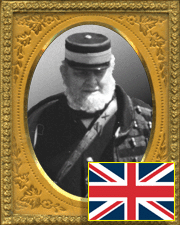
Military Observer's
Journal
 |
A Military Observer's Journal |
|
Military Observer’s Journal
One of the most striking demonstrations of how seapower could be used in a non-aggressive way to make a diplomatic point, came in 1860 during the Italian crisis. At that time, Italy comprised a squabbling group of separate states and one man, Giuseppi Garibaldi, set himself finally to solve the problem. He resolved to take control of the Island of Sicily --- then part of the Kingdom of Naples --- with the help of a small band of followers known as "The Thousand", intending to use the island as a base from which he could mount a full-scale invasion of the mainland of Italy. Although there was much public support in Britain for Garibaldi --- a privately raised 'English Regiment' actually fought in his army --- the official British policy was one of neutrality. Nonetheless, a detachment of the Mediterranean fleet under Rear Admiral Sir Rodney Mundy was sent to patrol the northern coast of Sicily and, on May 11, these ships interposed themselves between a Neopalitan squadron and two transports bearing Garibaldi's tiny invasion force. As a result, the Garibaldani landed unopposed in Sicily at Marsala and began a successful campaign. By mid-June the whole island was in the hands of the insurgents and, on August 18, Garibaldi, crossed the Straits of Messina, and began his conquest of the Italian mainland.
Eventually King Victor Emmanuel of Piedmont was proclaimed the First King of Italy and Garibaldi, having achieved his aim, relinquished his power and returned to his island home of Caprera. But his last act before leaving was symbolic: he visited Admiral Mundy on board his flagship HMS Hannibal and thanked him for his support! Technically the Royal Navy had done nothing but in fact Admiral Mundy's neutrality had been exercised in Garibaldi's favor. The British squadron had been in a position to stop the rebellion at the outset by preventing "The Thousand" from reaching Sicily; instead in a quiet and unobtrusive way, the British had been able to show their sympathy for Garibaldi without actually intervening forcibly -- a task for which warships were -- and still are! -- admirably suited. As Lord Palmerston wrote to Admiral Napier in 1847, "There are no better peacekeepers than well-appointed three deckers!"
Reference:
Colin White, Victoria's Navy. The End of the Sailing Navy, 1981, Kenneth Mason--Hampshire, England, Pages 132-133.
© 1999, James Mathews, all rights reserved. Contact Mr Mathews for permision to reproduce.
Return to the main Société d'Europe page
Return to the table of contents for "A Military Observer's
Journal"
Links to web sites related to this topic:
Society Web Page for James Mathews
The Adventures of Ian McKay